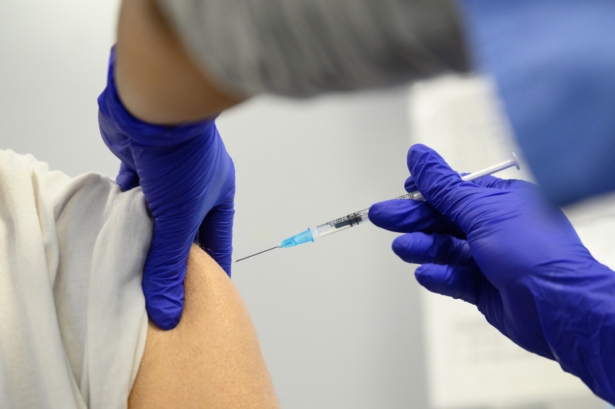The United Kingdom’s drug regulator detected a safety signal for heart inflammation after COVID-19 vaccination in early 2021, according to newly reviewed emails.
The UK Medicines and Healthcare Products Regulatory Agency (MHRA), the regulator, detected the signal by March 1, 2021, the emails show. The regulator did not warn the public about the issue for nearly four months.
MHRA officials ran an observed-to-expected analysis, or took the number of reports and compared them to the number of reports that were expected. According to emails from Dr. Georgy Genov, the head of the European Medicines Agency (EMA) Pharmacovigilance Office, the result was a safety signal that was written after consulting with MHRA.
Dr. Genov was consulting with colleagues and regulators worldwide after the EMA—like counterparts in the United States—when he was warned by Israel on Feb. 28, 2021, of around 40 post-vaccination cases of myocarditis, a form of heart inflammation, according to the emails.
MHRA claimed the signal was a “chance finding,” Dr. Genov said in one missive on March 1, 2021. The following day, he said that the issue was discussed at a meeting of the International Coalition of Medicines Regulatory Authorities, which includes many of the top regulators around the world.
“MHRA maintains prior orientation after review: statistical chance finding. No other regulator commented/expressed concerns,” Dr. Genov wrote.
MHRA officials told Dr. Genov in follow-up emails that the regulator was conducting additional analyses and “no evidence of a risk is now being seen in any of these analyses.” MRA said there were 16 cases of myocarditis or pericarditis, a related condition, one of which resulted in death. The youngest person affected was 32 years old.
The emails were obtained through a freedom of information request by “Benedikt,” who was hospitalized on March 29, 2021, with myocarditis after receiving his second Pfizer COVID-19 vaccination. Benedikt, a consultant, asked that his last name not be used due to a fear of professional repercussions.
The MHRA did not alert the public about the post-vaccination myocarditis and pericarditis until June 25, 2021. The regulator added warnings to the labels for the Pfizer and Moderna shots.
MHRA did not mention myocarditis or pericarditis in safety updates in April 2021, May 2021, or June 2021. In its July 2021 update, it advised vaccinated people to “seek immediate medical attention should they experience new onset of chest pain, shortness of breath, or symptoms of disturbance of cardiac rhythm.”
Other regulators apprised of the early cases also hid the cases for months. Despite a safety signal appearing in the United States, authorities did not alert the public until June 2021. Germany, where Benedikt lives and which is a member of the International Coalition of Medicines Regulatory Authorities, did not offer a warning until around the same time.
“Until summer 2021, German authorities told the press they were not aware of myocarditis risk. A clear lie documented by the files I obtained,” Benedikt told The Epoch Times in a message.

Doctors and lawyers said the new emails highlight why mandates are a bad idea and why trust in health authorities has declined.
“The agencies that are supposed to protect us have forfeited public respect and trust,” Dr. Jane Orient, executive director of the Association of American Physicians and Surgeons, told The Epoch Times in an email.
“This again exemplifies why health care decisions must always be left to the individual and never coerced by any government or so-called health authority,” Aaron Siri, managing partner of Siri & Glimstad LLP, told The Epoch Times in an email.
MHRA indicated it did detect a signal but defended its actions.
“Myocarditis was one of a number of adverse events of special interest that the MHRA and other global regulators have monitored since the start of C-19 vaccinations in line with our COVID-19 surveillance strategy. This included monitoring of Yellow Card data reported to the MHRA, data recorded in electronic healthcare records and evidence generated through independent studies,” MHRA told The Epoch Times in an email.
“With any such regular repeated analysis, there is an increased possibility of chance findings which do not reflect true associations, and therefore, it is important that data from multiple sources are assessed,” it added.
The regulator said it decided how to communicate with the public based on “all available evidence, including that received from international regulators, rather than using any one source in isolation.”
The EMA told The Epoch Times in an email that it “assessed the cases of myocarditis and pericarditis with mRNA vaccines in a prompt, robust and transparent manner.”
“EMA communicated to the public at every step of the assessment process through a number of established channels for safety communication,” it added.
No communication was offered through those channels until July 2021, despite EMA learning of the cases months earlier.
The EMA first spoke publicly about post-vaccination myocarditis on July 9, 2021, after its risk assessment committee concluded the Pfizer and Moderna vaccines could cause myocarditis and pericarditis. The EMA added myocarditis and pericarditis to labels for the Pfizer and Moderna COVID-19 vaccines shortly after.
EMA and MHRA declined to say whether they have internally reviewed keeping the information from the public for so long.
Other emails showed there were dozens of reported cases outside Israel in early 2021. One, dated March 2, 2021, said there had been 60 cases reported to VigiBase, including some from Germany. Another email described 35 cases, two of which had proven fatal.
Pfizer reported no cases received to their database during weekly meetings with Israel, according to a March 10, 2021 missive. But another email, dated April 28, 2021, showed an EMA official discussing the latest Monthly Summary Safety Report from Pfizer. The company had reported 72 cases, including 44 in the preceding four weeks, the official said.
Pfizer and Moderna have not responded to requests for comment on their early approach to myocarditis after COVID-19 vaccination.
From The Epoch Times


